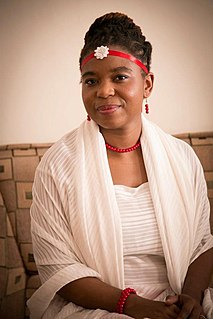A Quote by Kimberle Williams Crenshaw
Black women's intersectional experiences of racism and sexism have been a central but forgotten dynamic in the unfolding of feminist and antiracist agendas.
Related Quotes
I stand here as a black lesbian feminist, having been invited to comment within the only panel at this conference where the input of black feminists and lesbians is represented. What this says about the vision of this conference is sad, in a country where racism, sexism and homophobia are inseparable. . . .
A central tenet of modern feminist thought has been the assertion that "all women are oppressed." This assertion implies that women share a common lot, that factors like class, race, religion, sexual preference, etc. do not create a diversity of experience that determines the extent to which sexism will be an oppressive force in the lives of individual women.
The potential significance of Black feminist thought goes far beyond demonstrating that African-American women can be theorists. Like Black feminist practice, which it reflects and which it seeks to foster, Black feminist thought can create a collective identity among African-American women about the dimensions of a Black women's standpoint. Through the process of rearticulating, Black feminist thought can offer African-American women a different view of ourselves and our worlds
The times when black women have been successful in confronting and overcoming the structural and institutional sexism and racism that persists in our society have been when we are thoughtful and strategic about speaking up. It's when we've done what it takes to introduce and implement our ideas and our plans to make things better.
There are many things that black women can continue to do to help black folk. First, black women have historically been among the most vocal advocates for equality in our community. We must take full advantage of such courage by continuing to combat the sexism in our communities. Black women, whether in church, or hip-hop, don't receive their just due. Second, when black women are in charge of child-rearing, they must make ever so sure to raise black children who respect both men and women, and who root out the malevolent beliefs about women that shatter our culture.
Radical militant feminist believes that women of color and Black women in particular have written the cutting edge theory and really were the individuals who exploded feminist theory into the directions that has made it more powerful. So I see us as the leaders not just of Black people and Black women in terms of feminism but in terms of the movement as a whole.
The black conservative is responsible for making people question an idea that racism must be extinct before black people can overcome. Understanding that our goal is to thrive despite racism rather than fetishizing it is, in fact, the central ideological plank of people deemed "black conservatives." This is a coherent position, but that can be hard to perceive, given the way that race has been discussed in our land over the past 40 years or so.
... not all black women have silently acquiesced in sexism and misogyny within the African-American community. Indeed, many writers, activists, and other women have voiced their opposition and paid the price: they have been ostracized and branded as either man- haters or pawns of white feminists, two of the more predictable modes of disciplining and discrediting black feminists.
Maybe I'm a bad feminist, but I am deeply committed to the issues important to the feminist movement. I have strong opinions about misogyny, institutional sexism that consistently places women at a disadvantage, the inequity in pay, the cult of beauty and thinness, the repeated attacks on reproductive freedom, violence against women, and on and on. I am as committed to fighting fiercely for equality as I am committed to disrupting the notion that there is an essential feminism.



































